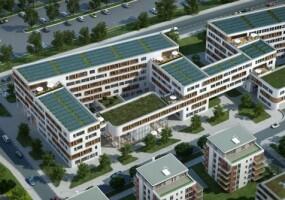The emergence of coworking spaces in Luxembourg
Coworking, as a flexible, community-based working model, has quickly established itself as an ideal solution for start-ups, entrepreneurs and businesses looking to optimise their space while fostering collaboration. Luxembourg in particular has embraced the concept, with innovative coworking spaces flourishing in the capital and beyond. Places such as Silversquare, The Office and Spaces have become benchmarks not only for their modern infrastructure, but also for their commitment to sustainability.
The rise of coworking in Luxembourg is also explained by the dynamism of the local economy, which attracts international talent and companies looking to establish themselves in an environment conducive to innovation. However, in the face of growing environmental challenges, it is becoming increasingly important for these workspaces to adapt to stricter environmental requirements.
Eco-responsible practices in coworking spaces
The move towards eco-responsible coworking spaces can be seen in a number of initiatives, from the design of buildings to the day-to-day management of resources. Several aspects are particularly highlighted in Luxembourg's coworking spaces, contributing to their positioning as actors committed to sustainability.
1. Use of environmentally friendly materials
One of the pillars of sustainable construction is the use of environmentally friendly materials. Many coworking spaces in Luxembourg are committed to using recycled or low carbon footprint materials in the construction and renovation of their premises. For example, the use of FSC (Forest Stewardship Council) certified wood or eco-friendly paints without VOCs (Volatile Organic Compounds) is becoming increasingly common.
These material choices not only benefit the environment, but also help to improve indoor air quality, creating a healthier working environment for occupants. Coworking spaces that adopt these practices become more attractive to companies and employees concerned about their well-being.
2. Sustainable use of energy resources
Energy consumption is another important aspect of eco-responsible practices in coworking spaces. More and more coworking spaces in Luxembourg are opting for renewable energy solutions, such as the installation of solar panels on roofs or the use of energy-efficient heating and cooling systems.
Lighting management also plays a key role in reducing energy consumption. Motion sensors and intelligent LED lighting systems limit energy wastage while ensuring optimum comfort for users. These initiatives, combined with efficient resource management, enable coworking spaces to reduce their carbon footprint while remaining competitive in the marketplace.
3. Waste reduction and recycling
Eco-responsible coworking spaces adopt strict waste management policies. This includes implementing selective sorting systems, using reusable crockery in kitchen areas and reducing the use of single-use plastics. In Luxembourg, initiatives such as Zero Waste Luxembourg encourage businesses, including coworking spaces, to reduce their waste production and adopt more environmentally-friendly practices.
Recycling office materials such as paper, ink cartridges and obsolete furniture is also a priority. Some coworking spaces go even further, offering workshops or conferences on sustainability and encouraging their members to adopt eco-responsible habits in their daily lives.
4. Optimise space and pool resources
The very concept of coworking is based on optimising space and pooling resources. By sharing offices, equipment and infrastructure, coworking spaces make more efficient use of resources, thereby reducing their environmental impact.
What's more, the flexibility of the spaces means they can adapt to the changing needs of businesses and workers, avoiding wasted space and the need to build new offices. This flexibility is particularly appreciated by companies looking to minimise their carbon footprint while benefiting from a modern, collaborative working environment.
The impact of eco-responsible coworking spaces on businesses and employees
Adopting eco-responsible practices in coworking spaces is not just a matter of meeting environmental standards. It also brings tangible benefits to businesses and employees alike.
1. Attractivité pour les entreprises engagées dans la durabilité
Les entreprises, en particulier celles qui intègrent des critères ESG (environnementaux, sociaux et de gouvernance) à leurs stratégies, sont de plus en plus attirées par les espaces de coworking qui respectent des normes élevées en matière de durabilité. Ces entreprises recherchent des solutions qui leur permettent de réduire leur propre impact environnemental, tout en offrant à leurs employés un cadre de travail sain et moderne.
En choisissant des espaces de coworking éco-responsables, les entreprises peuvent améliorer leur image de marque et attirer des talents sensibles aux questions environnementales. De plus, elles peuvent répondre aux attentes croissantes de leurs clients et investisseurs, qui exigent de plus en plus une transparence sur les pratiques écologiques des entreprises avec lesquelles elles collaborent.
2. Le bien-être des travailleurs et la productivité
Les espaces de travail qui intègrent des pratiques éco-responsables ont également un impact positif sur le bien-être et la productivité des travailleurs. Un environnement de travail sain, avec une qualité de l'air optimale, une gestion efficace de la lumière naturelle et des matériaux non toxiques, contribue à améliorer le confort des employés.
sustainability among their members. By raising awareness of green practices, these spaces encourage more responsible behaviour, both in the workplace and in everyday life. This can lead to better team cohesion, increased motivation and greater employee satisfaction.
As eco-responsible coworking spaces proliferate, environmental, social and governance (ESG) criteria are playing an increasingly central role in the decisions of real estate investors in Luxembourg. Companies and investors are seeking to align their choices with practices that not only benefit the planet, but also deliver long-term financial returns.
The growing importance of ESG criteria in commercial real estate
ESG criteria have become an imperative for investors, both locally and internationally. In the real estate sector, this includes assessing the sustainability of buildings, the impact of projects on local communities and the quality of governance of the companies that manage these assets.
Luxembourg, with its booming property market, is no exception to this trend. Institutional investors and real estate fund managers are paying increasing attention to the ESG performance of buildings, particularly in the office and warehouse segment.







